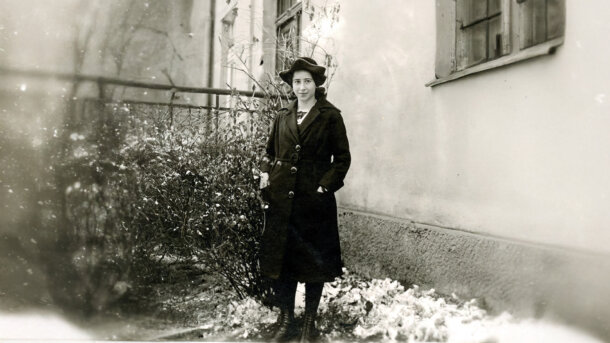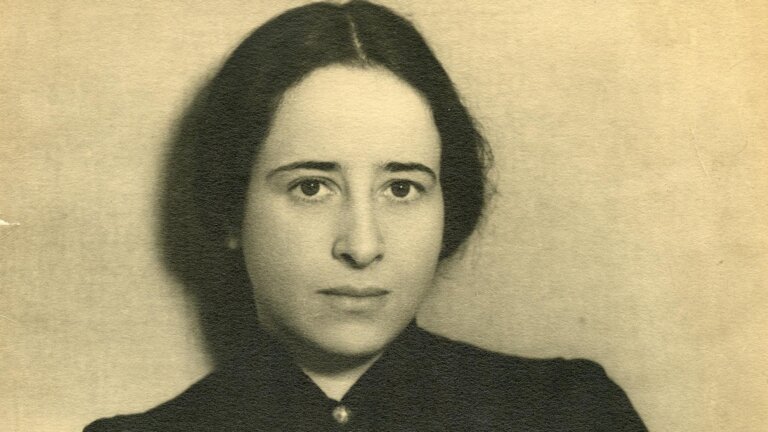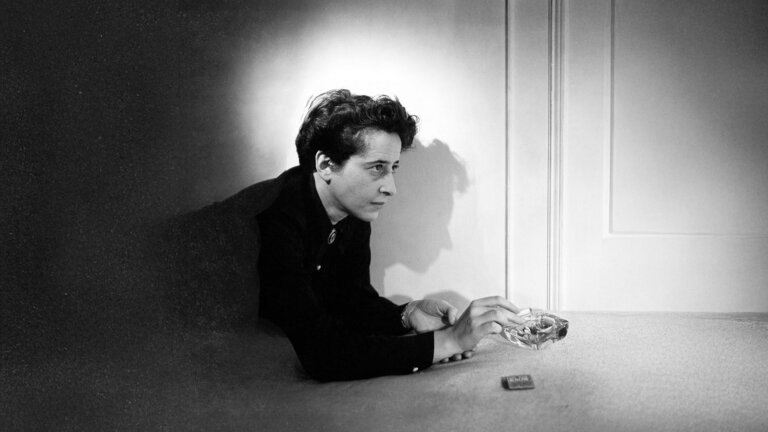Writer, editor and professor Ian Buruma explores Hannah Arendt’s evolving views on Jewish identity, political belonging and moral responsibility.
 Hannah Arendt was not right about everything.
Hannah Arendt was not right about everything.
How could she be? Adolf Eichmann, whose trial in Jerusalem was the subject of her most famous and—to some people—most notorious book, was not quite the banal figure she made him out to be. His chief characteristic in her view was a criminal lack of empathetic imagination. In fact, he was a Nazi fanatic who had taken pride in his role as the administrator of mass murder. Which is not to say that banal figures played no part in the Nazi attempt to kill all the Jews. She just picked a bad example. Arendt’s point that modern systematic industrial-scale genocide was made possible by the complicity of ordinary pen-pushers who found it easy to evade their personal responsibility by pushing it onto others was correct. The man in charge of railway schedules to the death camps was a long way removed from the men who pushed naked victims into the gas chambers, but he was no less culpable.
Some of Arendt’s best work, in a three-volume study entitled “The Origins of Totalitarianism,” concerns the nature of modern antisemitism. What she wrote about antisemitism has a lot to teach us about the treatment of minorities today, and of migrants, legal and illegal, in particular.
The history of antisemitism goes back many centuries, but something changed in the late 19th century, when religious prejudices against Jews shifted to racial and political antisemitism. Arendt saw clearly how Jewish emancipation in modern European nation-states created a new kind of prejudice, which turned out to be even more lethal than the old religious hatreds.
In secular societies, Jews were no longer easily distinguished from Gentiles by cultural habits or distinctive dress. Since well-educated Jews were well-represented in such typical institutions of the modern state as the press, high finance, popular entertainment and academia, modern antisemites began to see Jews as infiltrators and sinister manipulators who wielded enormous power behind the scenes to further their own nefarious interests.
A mark of the modern liberal state is the rule of law that protects all citizens, regardless of race and creed. Citizenship is a legal concept, and not a romantic one based on religious faith, bloodlines or some notion of a common national spirit. Antisemites in late 19th century Germany despised such countries as Britain, France and the U.S. precisely for this reason. Anyone, in theory, could become an American or a French citizen. To antisemites, who yearned for a largely imaginary old order of church, monarchy and ethnic purity, the Jew represented everything they loathed about the modern secular liberal state.
In her analysis of totalitarianism, Arendt stressed the importance of the citizen as a constitutional person with political rights protected by law. Arendt wrote that the “first essential step on the road to total domination is to kill the juridical person in man.” Without rights or the legal protection of the state, a person ceases to exist as a citizen and becomes totally vulnerable. This is what happened to Jews, such as Arendt herself, in Nazi Germany. The symbol of totalitarian violence and control, in Arendt’s view, is the concentration camp that “exists outside the normal penal system” and where people are sent “outside the normal judicial procedure.” The concentration camp inmate no longer exists as an individual with a name, let alone as a citizen, but as a number tattooed into an arm.
Refugees, asylum-seekers and illegal immigrants, languishing in squalid camps from the Turkish-Syrian border to holding pens in Louisiana, are not tattooed or murdered in gas chambers, but their status of people without rights, often beyond the protection of the law, is analogous to that of Jews in Nazi Europe. Analogous does not mean the same, of course, but the parallels are disturbing enough.
Arendt was convinced that Jews had made themselves more vulnerable in the 20th century by their failure to organize politically. They relied too much on the state to protect them. How they should have organized themselves is a little unclear. But, in fact, a fairly large number of Jews in certain countries did get organized politically. Early Zionism, ranging from religious millenarianism (the belief in a future positive transformation of society) to socialist idealism, was a clear example of this.
Arendt herself was highly sympathetic to Zionism for that reason. She recognized Zionism as a way to achieve Jewish self-determination. A state for Jews would offer the legal and political protections that would keep them safe from the persecution they faced in parts of Europe. And socialist Zionism would build a more equitable society than existed in the countries that Jews elected to leave behind.
But Arendt grew disillusioned when she saw how the state for Jews became more and more a Jewish state in which non-Jews were not treated as equals.
In the Europe of Arendt’s early life, there were tensions between the state, which is a a legal construction, and the nation, based more on common culture, history and ethnic origin. Nationalists wanted the two to coincide, but this would always remain imperfect—as it should be in an open liberal society. The more the nation is emphasized at the expense of the state, the greater the vulnerability of minorities.
This is why Arendt became such a fierce critic of Israel, and why she was so skeptical of the Eichmann trial as a way to forge solidarity between the Jewish nation and Jews worldwide. It is also why her writing is more relevant than ever in today’s world, where nationalism, populism and identity politics of the left and the right are once again putting pressure on the rule of law and the juridical person. The first victims of lawlessness are the migrants and refugees who are deprived of citizen’s rights. But the aim of xenophobic nationalists to undermine the liberal concept of citizenship and to turn us all into members of warring tribes will lead to precisely the kind of closed society that Arendt spent her life combatting.
The views and opinions expressed in this article are those of the writer.

















